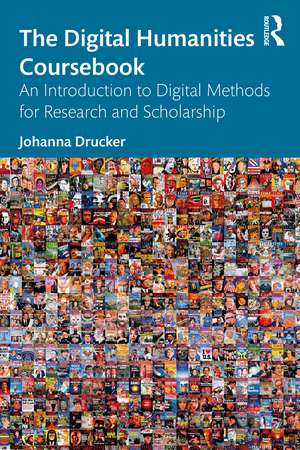The Digital Humanities Coursebook: An Introduction to Digital Methods for Research and Scholarship
Autor Johanna Druckeren Limba Engleză Paperback – 25 mar 2021
| Toate formatele și edițiile | Preț | Express |
|---|---|---|
| Paperback (1) | 280.47 lei 3-5 săpt. | +19.69 lei 6-12 zile |
| Taylor & Francis – 25 mar 2021 | 280.47 lei 3-5 săpt. | +19.69 lei 6-12 zile |
| Hardback (1) | 1002.99 lei 6-8 săpt. | |
| Taylor & Francis – 25 mar 2021 | 1002.99 lei 6-8 săpt. |
Preț: 280.47 lei
Nou
53.67€ • 55.97$ • 44.61£
Carte disponibilă
Livrare economică 27 februarie-13 martie
Livrare express 12-18 februarie pentru 29.68 lei
Specificații
ISBN-10: 0367565757
Pagini: 252
Ilustrații: 9 Tables, black and white; 9 Line drawings, black and white; 23 Halftones, black and white; 32 Illustrations, black and white
Dimensiuni: 156 x 234 x 15 mm
Greutate: 0.38 kg
Ediția:1
Editura: Taylor & Francis
Colecția Routledge
Locul publicării:Oxford, United Kingdom
Public țintă
Postgraduate and UndergraduateCuprins
List of Figures; List of Tables; Preface; Chapter 1 Digital Humanities Overview; Chapter 2 Data Modeling and Use; Chapter 3 Digitization; Chapter 4 Metadata, Markup, and Data Description; Chapter 5 Database Design; Chapter 6 Information Visualization; Chapter 7 Data Mining and Analysis; Chapter 8 Mapping and GIS; Chapter 9 Three-dimensional and Virtual Models; Chapter 10 Interface Design; Chapter 11 Web Presentation Formats and Networked Resources; Chapter 12 Project Design and Intellectual Property; Coda: A note on advanced topics in Digital Humanities; Index
Notă biografică
Johanna Drucker is the Distinguished Breslauer Professor in Bibliography in Information Studies at UCLA, USA. She has published widely on topics related to visual design in digital and print forms. Her publications include: Graphesis (2014), Diagrammatic Writing (2013), The Visible Word (1994), and Visualization and Interpretation (2020).
Descriere
The Digital Humanities Coursebook provides critical frameworks for the application of digital humanities tools and platforms, which have become an integral part of work across a wide range of disciplines.
Written by an expert with twenty years of experience in this field, the book is focused on the principles and fundamental concepts for application, rather than on specific tools or platforms. Each chapter contains examples of projects, tools, or platforms that demonstrate these principles in action. The book is structured to complement courses on digital humanities and provides a series of modules, each of which is organized around a set of concerns and topics, thought experiments and questions, as well as specific discussions of the ways in which tools and platforms work. The book covers a wide range of topics and clearly details how to integrate the acquisition of expertise in data, metadata, classification, interface, visualization, network analysis, topic modeling, data mining, mapping, and web presentation with issues in intellectual property, sustainability, privacy, and the ethical use of information.
Written in an accessible and engaging manner, The Digital Humanities Coursebook will be a useful guide for anyone teaching or studying a course in the areas of digital humanities, library and information science, English, or computer science. The book will provide a framework for direct engagement with digital humanities and, as such, should be of interest to others working across the humanities as well.




















